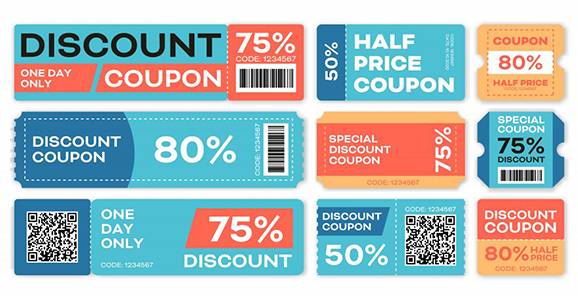In this era of online shopping, where every dollar matters, coupons have turned into a consumer's lifesaver. A small discount, even if it's only 5% or 15% off, goes a long way towards extending those hard-earned dollars.
But in the middle of this savings hunt, there's a lurking danger: fake coupons or coupon scams! In 2021, coupon fraud incidents increased by 25% compared to the previous year, costing businesses millions annually. Fake coupons and deceptive offers are just two examples of these cunning tactics that harm companies in addition to fooling customers.
Intending to educate readers about the different kinds of coupon scams that target them, this post provides helpful advice on how to spot fake coupons, shop wisely, and keep yourself safe from all kinds of online coupon frauds.
What is Online Coupon Fraud?
When people use fake or incorrect coupons to obtain discounts they shouldn't be eligible for, it's known as coupon fraud. This could include using a coupon repeatedly when it was only intended for one use, altering the coupon's information to increase its value, and then selling it, or even using it for purposes for which it was not intended.
On actual coupons, people occasionally search for errors—typos or other mistakes—and then take advantage of those errors. For instance, they might modify a coupon that was intended for something else with ‘too-good-to-be-true deals’ to fool the customers.
Both regular shoppers and businesses suffer from coupon fraud. One survey of 1,000 U.S. adults aimed to find common shopper and retailer behaviors that could lead to coupon fraud.
Due to this, businesses lose money as a result, and they may decide to raise prices for everyone. Furthermore, if word spreads that a company is using phony coupons, it may cause customers to lose faith in it.
How Online Coupon Fraud Works?
When people use coupons improperly, they commit coupon fraud. Sometimes, it is intentional, and other times it is an error.
Assume you have a coupon that offers a discount on a particular item. However, you choose to use the coupon for something entirely different rather than purchasing that item. Coupon fraud is that.
However, it's not limited to shoppers. Occasionally, retailers themselves participate in the scam. For coupons they never really used or for goods they never even sold, they might ask the companies for their money back.
Nowadays, there are many cunning methods that people use to steal coupons. 81% of coupon abuse attempts are said to come from serial abusers. They occasionally duplicate coupons to use at other retailers. Some might steal the coupon inserts from newspapers by swiping them. Then there are people who put pressure on cashiers to accept phoney coupons and may even purchase pricey items for significantly less.
Now, here comes the tricky part. Some coupon detectives are very skilled at identifying errors on coupons, such as typos, or figuring out how to take advantage of digital coupons. The coupon will then be altered to appear to be for a different item. To save money after that, they might sell it or keep using it themselves.
Thus, it’s pretty clear that coupon fraud is not fair play and is detrimental to both! It is something that all consumers and businesses should be aware of, as 90% of US consumers admit to using coupons while shopping, while 73% of US retail executives have reported some level of promo fraud.
Types of Coupon Scams for Consumers
Since coupon fraud is not a cool activity at all and messes things up for everyone, here we have mentioned 4 different types of coupon scams that directly affect consumers and hence one must always be aware of them. Have a look!
1. Counterfeit Coupons:
Counterfeit coupons are false coupons usually produced using equipment like printers or scanners. They appear to be very real, but what's the catch? They're not genuine.
These fraudulent coupons proliferate both online and offline, giving businesses a great deal of trouble. Businesses can use cool security features like barcodes or holograms to prevent this. It's also sage for us shoppers to steer clear of offers that look too good to be true.
2. Fake Coupon Certificate Books:
Scammers offer coupon certificate books to customers at a steep discount, with the assurance that they can recoup their investment by selling the certificates separately.
Nevertheless, purchasers frequently suffer losses when these certificates don't sell well. Those who purchase them risk identity theft by having to pay hefty amounts for fictitious fees.
3. Coupon Clipping Scam:
It is acceptable for customers to clip actual coupons from newspapers, magazines, or other printed materials to take advantage of sales or discounts at participating retailers.
The majority of coupon clipping scams are deceptive schemes in which con artists pretend to provide chances for victims to profit from coupon clipping. These frauds, however, are dishonest and take advantage of people looking for extra money.
4. Online Coupon Scams:
As digital coupons become more popular, con artists take advantage of online platforms to distribute bogus or invalid coupons. To get the coupon, they might ask users to share spam links, sign up for services, or finish surveys. The majority of the time, consumers either receive bogus or invalid coupons in exchange for their money. To trick users, scammers may also use images that link to malicious websites.
How to Spot Fake Coupons?
There are significant risks associated with fake coupons, like having your financial and personal information stolen or having viruses installed on your computer. It is challenging to resolve the situation because scammers can use this data for fraudulent purposes.
For this reason, it's critical to recognize phoney coupons to prevent falling for them.
Here are a few easy methods for telling authentic coupons from fakes.
1. Expensive Coupons
Valid coupons are never sold for less. Selling or attempting to duplicate coupons is against the law and fraudulent. Retailers frequently provide free promo codes or discount coupons to their most devoted patrons. It's probably a scam if someone asks for money in return for a coupon.
2. Coupons for Free Products
An average shopper encounters about 5 misleading coupons online each month. Coupons that offer free products frequently direct users to fraudulent websites. Usually, these websites ask for personal information while pretending to be offering a freebie.
In actuality, they use this data for nefarious activities like spamming and identity theft. When presented with such an offer, proceed with caution and do not divulge any sensitive information.
3. No Links to Stores
Genuine coupons usually have links that take you to the store's or brand's official website, where the promotion is being offered. A coupon is probably fake if it doesn't take you to the retailer's website. Make sure you verify the coupon's source twice before using it.
4. Missing Expiration Dates
Since they specify how long they are good for use, genuine coupons have expiration dates. Coupons with perpetual validity or no expiration dates are probably fake. These coupons are frequently distributed in an attempt to trick gullible customers into believing they have an endless amount of time to take advantage of the deal.
5. Hasty Deals
In order to create a sense of urgency in consumers, scammers often use the technique of creating coupons with short expiration dates and hasty deals. People are compelled by this pressure to click on the coupon quickly without giving it careful thought. Coupons that require immediate action or have an unusually short expiration date should be avoided.
6. Poor Graphics or Errors on Coupons
Valid coupons are painstakingly created with precise branding, crisp graphics, and unambiguous directions. Conversely, counterfeit coupons frequently have obvious imperfections like spelled words incorrectly, inconsistent fonts, distorted images, and misplaced logos. These differences are unmistakable signs of a fake coupon.
7. Barcode Errors
Genuine coupons have barcodes on them, which make it simple to scan them at checkout counters. False coupons, however, could have poorly printed barcodes that cannot be read by scanning equipment, or they might have no barcodes at all. A coupon's counterfeit nature is indicated by a significant red flag: a missing or illegible barcode.
8. Easy Money in Return for Coupon Clipping
Consumers should be wary of any offers claiming easy money or guaranteed returns with little work to avoid becoming prey to coupon clipping scams.
Any business or person offering coupon-clipping opportunities should be thoroughly investigated, and they should be cautious of demands for upfront payments or confidential data. Customers should also follow their gut feelings and avoid taking advantage of any offers that appear too good to be true.
9. Risky Payment Method
Unknown payment methods are a common tool used by scammers to hide their identities and avoid being discovered. Should a coupon ask for payment via unusual or dubious means, proceed with caution and do not complete the transaction. Steer clear of any transactions involving dubious payment methods to protect yourself.
Tips and Tricks to Avoid Being a Victim of Online Coupon Fraud
As of early 2023, over 15 percent of single people in the United States had been denied usage of a coupon in a store because they were told the coupon was fraudulent. Therefore, here we have brought you tips and tricks to avoid getting fooled by coupon scams.
- Verify Coupon Source: To ensure authenticity, always verify coupons from reliable sources like newspapers, magazines, or official retailer websites.
- Don't Pay for Coupons: Since genuine coupons are usually given out without charge, you should avoid paying for them to protect yourself from scammers.
- Online Safety Tip: Watch out for phishing attempts to obtain personal information by using caution when downloading coupons from forums or opening email attachments containing coupons.
- High-Value Offers: Coupons that offer remarkably large discounts or free products should be questioned because they may be fake or counterfeit.
- Verify Consistency: Examine the coupon for any indications of fraud, such as poor-quality photos or misspellings, and compare the stated value with the barcode.
- Seek Verification: To determine the authenticity of a coupon, check online resources such as the Coupon Information Center's list of bogus coupons, or get in touch with the company directly.
- Be Wary of Work-At-Home Possibilities: Deals that involve selling coupon books or clipping coupons should be avoided as they might be fraudulent schemes.
- Preserve Personal Information: Refrain from giving out personal information to receive coupons, and confirm the authenticity of any programs related to coupons with respectable establishments such as the Better Business Bureau.
How to Deal with Online Coupon Fraud Incidents?
Encountering online coupon fraud is still a problem because, according to recent study findings, in 2019, coupon fraud rose by 12 percent year over year — despite the shifts to digital discounts.
Thus, to protect others as well as yourself, you must know how to deal with coupon fraud. Here is what you can do, if you come across coupon fraud or have reason to believe that a coupon is phony.
- Gather Proof: Begin by compiling all pertinent data regarding the fraudulent transaction, such as the product details, customer information, date, time, and receipt number in addition to the coupon code. For documentation purposes, take pictures or screenshots of the coupon and receipt. This proof will back up your allegation and show how big the scam is.
- Speak with the Authorities: To report the scam, get in touch with groups like the Coupon Information Centre or law enforcement organizations like the Federal Bureau of Investigation (FBI) and Federal Trade Commission (FTC).
- Spread the Word: Tell your loved ones about the fraud, particularly if they have shared the coupons. This lessens the likelihood that more people will fall for the scam.
Note that everyone can be protected from the negative effects of coupon fraud by being alert and reporting suspicious activity, so make sure to follow the above steps if ever come across a fraudulent coupon next time.
Conclusion
We understand that you are super excited about your coupon stackings, and scoring deals. However, not all coupons are your trusty coupons always! Utilize our above-provided information to spot coupon scams, and if you encounter one, feel free to report it and spread the word to protect everybody’s savings and to sand against coupon fraudsters!


